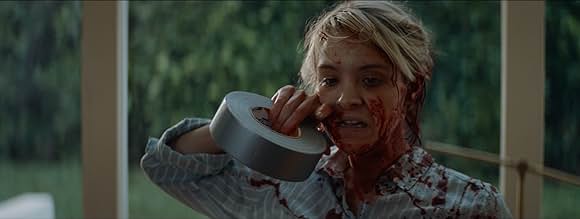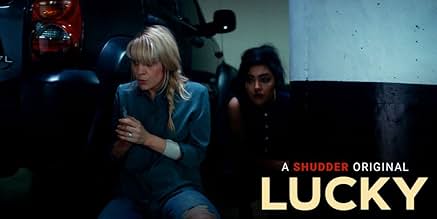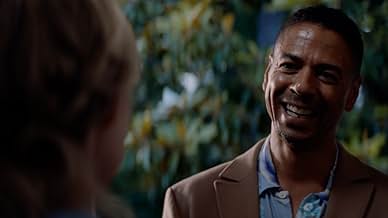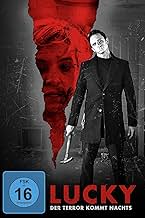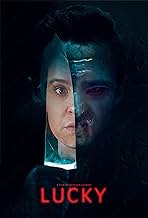VALUTAZIONE IMDb
4,9/10
2987
LA TUA VALUTAZIONE
Una donna di periferia lotta per essere creduta mentre si ritrova inseguita da una figura minacciosa che torna a casa sua notte dopo notte. Quando non può ricevere aiuto da chi le sta intorn... Leggi tuttoUna donna di periferia lotta per essere creduta mentre si ritrova inseguita da una figura minacciosa che torna a casa sua notte dopo notte. Quando non può ricevere aiuto da chi le sta intorno, è costretta a prendere in mano la situazione.Una donna di periferia lotta per essere creduta mentre si ritrova inseguita da una figura minacciosa che torna a casa sua notte dopo notte. Quando non può ricevere aiuto da chi le sta intorno, è costretta a prendere in mano la situazione.
- Regia
- Sceneggiatura
- Star
- Premi
- 1 candidatura in totale
Leith M. Burke
- Rob
- (as Leith Burke)
Nikea Gamby-Turner
- Detective
- (as Nikea Gamby Turner)
Recensioni in evidenza
This movie has promising potential that sucks you in, and then quickly goes off the rails. The concept is entertaining, but the vision was lost. It would have made for an excellent horror comedy if they could have executed at least one portion of the storyline clearly.
1. Poor or non-existent forensics reduced the credibility of the story.
2. Like a poor teacher the storyline does not direct the audience into thinking about the issue of fear, but instead has us asking what's going on. The focus was on knives, hammers, blood on floor, bodies gone.
3. Bodies disappearing opens many interpretations some of which are nonsensical which added to the confusion. Was she hallucinating; a metaphor; ghosts/spirits?
4. The poor response to securing the home & ways of protecting one's self gives us another female victim character as helpless & lacking intelligence.
5. Even the DVDs special feature of production staff audio commentary overlay said nothing about the story itself, but only camera angles, lighting, etc.
2. Like a poor teacher the storyline does not direct the audience into thinking about the issue of fear, but instead has us asking what's going on. The focus was on knives, hammers, blood on floor, bodies gone.
3. Bodies disappearing opens many interpretations some of which are nonsensical which added to the confusion. Was she hallucinating; a metaphor; ghosts/spirits?
4. The poor response to securing the home & ways of protecting one's self gives us another female victim character as helpless & lacking intelligence.
5. Even the DVDs special feature of production staff audio commentary overlay said nothing about the story itself, but only camera angles, lighting, etc.
I saw this film on Shudder, titled "It's A Secret", so I knew to expect something off the beaten path from a typical horror film. The constant looming presence of the silent killer has a very Michael Myers-esque approach to an abstraction of the turmoil the protagonist faces as she (Goes) It Alone with some fairly well-put together kills along the way, but the climax isn't one for anyone who expects clear answers. I had to stop treating this film as a standard film with a beginning, middle, and end (?) and instead focus on the way she deals with the killer rather than expect any explained reasons why he's there. It gets surreal towards the end, but I can't say I disliked it.
Writer and protagonist Grant has something to say about violence against women-- something to say about the ways that some women are hobbled by fear of violence. Unfortunately, what Grant has to say is not clear.
Is Lucky a study on the meaningless surreality of some of these fears, that their focus is on some masked stranger in a parking garage rather than on one's husband, the vastly more likely source of violence? Or is Lucky instead arguing that those masked strangers are inappropriately disregarded as a legitimate source of fear? Does Lucky argue that women need to stick together to escape their chains? Or does it instead tell us that women should "Go It Alone" because solidarity is hopeless? When Grant angrily insists that her success is 100% a function of her hard work, are we as the audience supposed to be cheering for her self-regard or shaking our heads at her self-importance? Are we invited to think that all men (save our husbands, of course) are responsible for our fear, or are we instead asked if we're failing to see "Schrodinger's Rapist" as something other than an object-- a man with a face, many men with many faces?
Maybe Grant isn't sure about any of that, and Lucky is just asking a lot of questions. Maybe it's less of a manifesto, more of a meditation. But if so, even that uncertainty is unclear. Lucky merely allows us to be reminded of our own questions-- or of our own certainty regarding the answers-- and if we have none, then Lucky doesn't do anything to change that.
That might be okay sometimes. Like Inglorious Basterds, Lucky seems to be fine with you ignoring the critical questions. In Lucky's case, in favor of just watching a poppy, PG-13 thriller. Unfortunately, Lucky doesn't travel the traditional scales of pop. It is a thought experiment, with little relationship to reality, yet never embraces this, never surprises us with any genuine weirdness. Any transformation here is transient-- abandoned in the third act. And there is no reveal, no catharsis; the unmasking has no impact on the movie as a work of entertainment. There is no denouement. The plot questions are never answered.
But it's not poorly made: the acting is generally decent (although there are occasional awkward missteps); it's not overly long; the production values are good. Lucky may not hit the targets it aimed for, but it's an acceptable way to blow an hour and a half.
Is Lucky a study on the meaningless surreality of some of these fears, that their focus is on some masked stranger in a parking garage rather than on one's husband, the vastly more likely source of violence? Or is Lucky instead arguing that those masked strangers are inappropriately disregarded as a legitimate source of fear? Does Lucky argue that women need to stick together to escape their chains? Or does it instead tell us that women should "Go It Alone" because solidarity is hopeless? When Grant angrily insists that her success is 100% a function of her hard work, are we as the audience supposed to be cheering for her self-regard or shaking our heads at her self-importance? Are we invited to think that all men (save our husbands, of course) are responsible for our fear, or are we instead asked if we're failing to see "Schrodinger's Rapist" as something other than an object-- a man with a face, many men with many faces?
Maybe Grant isn't sure about any of that, and Lucky is just asking a lot of questions. Maybe it's less of a manifesto, more of a meditation. But if so, even that uncertainty is unclear. Lucky merely allows us to be reminded of our own questions-- or of our own certainty regarding the answers-- and if we have none, then Lucky doesn't do anything to change that.
That might be okay sometimes. Like Inglorious Basterds, Lucky seems to be fine with you ignoring the critical questions. In Lucky's case, in favor of just watching a poppy, PG-13 thriller. Unfortunately, Lucky doesn't travel the traditional scales of pop. It is a thought experiment, with little relationship to reality, yet never embraces this, never surprises us with any genuine weirdness. Any transformation here is transient-- abandoned in the third act. And there is no reveal, no catharsis; the unmasking has no impact on the movie as a work of entertainment. There is no denouement. The plot questions are never answered.
But it's not poorly made: the acting is generally decent (although there are occasional awkward missteps); it's not overly long; the production values are good. Lucky may not hit the targets it aimed for, but it's an acceptable way to blow an hour and a half.
I appreciate directors and writers who try to do things a little differently to the constant identical horror movies we see everyday. And I like the fact we get presented with movies that aren't as straightforward as others. This movies reminds me of Mother! While I like the ideas behind the movies and trying to get people to think outside the box, the execution of these films needs to be a little tidier. They start off really interesting and as a viewer, you're really intrigued and excited....and then they just go to a weird place and don't come back, and you're sitting there thinking...'huh?'
There were several plot holes in this film and many things that were introduced were not explained at all. Not everyone who watched will be able to deduce certain clues brought up. It doesn't need to be a blatant in your face explanation that takes away from the mystery of the film, but it does need to be addressed in a way the viewer is like, 'ah, ok...I see what they did there.' It felt unfinished at 1hr 20mins. Could have packed a bit more in to wrap things up.
There were several plot holes in this film and many things that were introduced were not explained at all. Not everyone who watched will be able to deduce certain clues brought up. It doesn't need to be a blatant in your face explanation that takes away from the mystery of the film, but it does need to be addressed in a way the viewer is like, 'ah, ok...I see what they did there.' It felt unfinished at 1hr 20mins. Could have packed a bit more in to wrap things up.
Lo sapevi?
- BlooperAt 19:32, when May is talking to Ted's sister Sarah, her iPhone isn't compatible with the case she's using.
- ConnessioniFeatured in Dead Meat Podcast: Interview with Brea Grant (2021)
- Colonne sonoreSign of the Times
Written by Hannah Fairlight
Produced by Michael Wagener
Performed by Hannah Fairlight
I più visti
Accedi per valutare e creare un elenco di titoli salvati per ottenere consigli personalizzati
- How long is Lucky?Powered by Alexa
Dettagli
- Tempo di esecuzione1 ora 23 minuti
- Colore
- Proporzioni
- 2.39 : 1
Contribuisci a questa pagina
Suggerisci una modifica o aggiungi i contenuti mancanti




